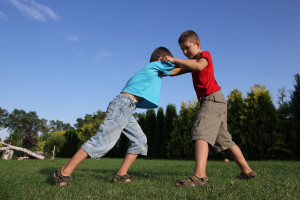Recently I came across something online about the shidduch/Orthodox dating system about was very harsh and negative. The shidduch system without a doubt has its problems, because it’s a system and systems can never be individualized to meet the needs of all individuals. However, it’s overall a very good system with a very high degree of success.
I met my husband almost 24 years ago when the idea was suggested by a couple who knew us both. We went out seven times over the course of two and a half weeks, and got engaged on our seventh date. We were engaged for ten weeks, and three months after we met were married.
When I heard about this approach to dating when I was growing up, I couldn’t imagine how it worked. You hardly know the person, for goodness sakes! How in the world can you commit to spending your life with someone that you don’t know?
Shidduch dating is the opposite of the casual, ‘try it on to see how you like it and throw it away if you change your mind’ approach toward relationships that is so common in the 21st century. You would think that if the length/degree of involvement with someone is the most critical factor in determining suitability for marriage, a couple that has lived together prior to marriage should be significantly more likely to have a long term stable marriage. However, studies have shown that those who live with their partners before getting married have a higher divorce rate and lower rate of marital satisfaction than those who don’t.
What if success in marriage isn’t about how long you know someone, but how committed you are to mutual goals and to one another? What if you carefully and thoughtfully think about who you are and what kind of person you want to spend your life with, and carefully and thoughtfully go about the dating process to find that person? What if the system is set up to support you in doing this, and others who are in the system share similar intentions and understandings?
Shidduch dating is very different from being set up on a blind date. It works because there are some ground rules that set the tone for mature relationships.
- Compatibility – In the shidduch dating world, people are matched for compatibility in important areas before they ever meet. Suggestions are made and then looked into. Only if both sides agree that the important things match up does the couple go out to see if they hit it off personality-wise.
2) Commitment – Both parties are going out because they are seriously interested in finding a marriage partner. There’s mutual clarity on what the purpose of going out is. You don’t have one person getting attached with hopes that one day it might lead to a long term relationship and five years later the other announces he’s not interested in marriage. If they don’t emotionally connect after meeting a few times, then they move on and go out with someone else.
3) Focus – When dating, the intention is to get to know the other person. No hanging out for weeks or months with casual chit chat or going to activities where you don’t interact with one another. That doesn’t mean that shidduch dates aren’t fun! My husband and I enjoyed parks, picnics, restaurants, miniature golf and a museum when we dated. However, the setting or activity is the backdrop to help someone get to know what the other person is like, what matters to them and what life direction they want to take. What are their goals and aspirations? What kind of character do they have?
4) No physical contact – Physical contact is like emotional superglue and can prematurely create feelings of connection before a mature emotional context for the relationship is there, clouding one’s judgment about if this is the person they really want to spend the rest of their life with.
You’d be amazed at how much you can get to know someone when you’re meeting in a purposeful and thoughtful way with the intent to see if someone would make a good life partner!
If there are questions you have about the process, please ask and I’ll do my best to address them in a separate post.
Avivah


![paradigm_shift1[1]](http://avivahwerner.com/wp-content/uploads/2016/01/paradigm_shift11-300x198.jpg)
